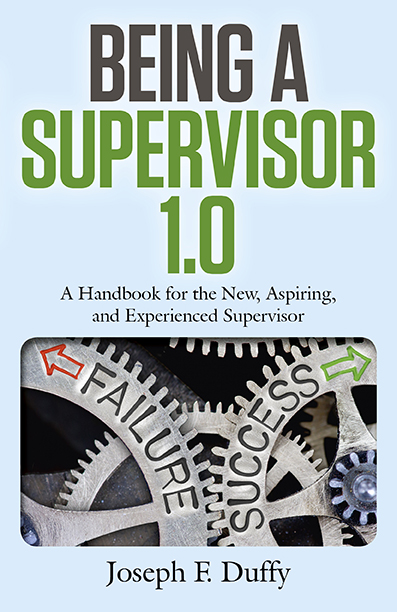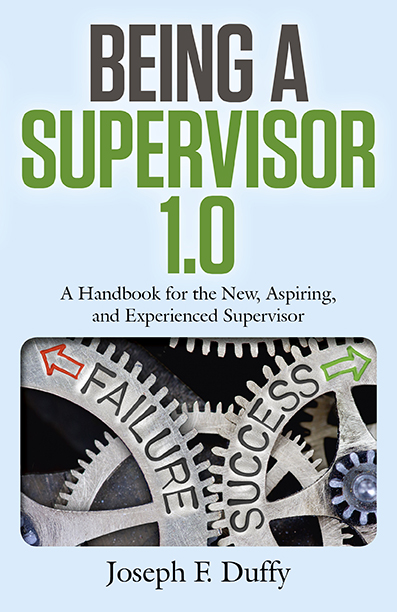

Search:
Contents:
- CHAPTER 1 HOW TO SUBMIT AN INQUIRY
- CHAPTER 2 WRITING YOUR PROPOSAL
- CHAPTER 3 THE CONTRACT OFFER
- CHAPTER 4 AUTHOR SERVICES
- CHAPTER 5 THE EDITORIAL AND PRODUCTION PROCESS
- CHAPTER 6 MARKETING YOUR BOOK
- CHAPTER 7 FAQs
- CHAPTER 8 ROYALTIES
TEN SELF-CARE REQUIREMENTS FOR SUPERVISORS IN TODAY’S VIRTUAL WORK ENVIRONMENT: SUPERVISON IN THE AGE OF CORONAVIRUS (COVID-19)
By Joseph F Duffy
Author of:
Being a Supervisor 1.0
Introduction: I am writing this article on self-care in the Age of Coronavirus, from the perspective of a supervisor and his/her conflicting obligations to direct reports, boss and self, and the belief that the supervisor’s own self-care is often neglected. I first wrote on the subject of Supervisory Self-Care in 2018, dedicating a chapter on the subject in my book “Being a Supervisor 1.0”. Since then I wrote two articles on the subject, Self-Care for Supervisors; Thank You for Flying Self-Care Air, February, 2019 and Supervisors Should Have Their Own Self-Care Plan, April, 2019.
The book chapter and articles were premised on three things. The first was the actual work environment pre-coronavirus, that is, the majority of the work took place at the work site, a physical place to which employees came and went home from each day of the work week. The second was a widespread belief among the ranks of supervisors was that they had to take care of their team and their boss. Often that expectation was a part of the supervisor’s job description. The supervisor was expected to be the hero, the champion, the strong one, sacrificing personal needs and wants to others. And the third was that the supervisor who ignores personal self-care, will over time, suffer for doing so, perhaps experiencing increased stress, physical ailments, decreased job performance and productivity, burnout, even flame out.
Since the coronavirus pandemic the world of work has been turned upside down. Much of what was recommended in that chapter and the two articles centered on physically being at the worksite and taking action at the worksite. Some of the brainstorming ideas that went into the self-care plans I espoused in the chapter and articles no longer apply or will at least, need some modification.
The underlying premise, that supervisors often ignore personal self-care, eventually at their expense and that supervisors must take care of themselves of they are to continue taking care of subordinates and their boss, is still valid, even more so in these increasingly stressful coronavirus times. And so I decided to write this article about the importance and value of supervisory self-care in this coronavirus time period. I will not repeat all that was covered in the first two articles but would recommend you skim them to more fully appreciate the importance of supervisory self-care (you can click on the links for those two articles in the first paragraph above).
If you don’t already have a self-care plan, I urge you to write one following the steps in Supervisors Should Have Their Own Self-Care Plan, April, 2019. If you do have a self-care plan I suggest you update it, recognizing the changed world we are living in, seeking to establish a new balance in your life, and finding creative ways to care for yourself. Be flexible, more so in these times. Expect circumstances to continue to change and adjust your plan accordingly.
Many folks (health care workers, first responders, police and fire personnel, food stores and gas station staff) are going to work and dealing with the stress of having contact with potential coronavirus victims or carriers (and bringing that home). Others are working from home dealing with the stress of balancing work and home time wondering and worrying how they will survive, what next. And very sadly, many are home bound and not working with all those same worries. Those living with a spouse and children might be thinking the house has shrunk, trying to put on a strong happy face for spouse and children, feeling added stress of home schooling, play supervisor, general parenting and trying to actually work at home. Those living alone, might enjoy the peace and quiet only to find in short order, that the silence is deafening and monotonous and worry more about who will care for you if you come down with coronavirus or something else, who will even know. Either way, cabin fever may result. Ouch!
The guidance that follows is not the definitive guide to self-care in the time of coronavirus. If anything, it is a place to begin. I base it on my 45 year career in health and human services administration. As a hospital social work director in the 1970s, our hospital staff welcomed the influx of AIDS patients at the same time experiencing the fear and anxiety of contracting that then deadly disease. I saw first-hand the impact that had on staff. Heading Catholic Charities in Northern NJ in the wake of 9/11, I experienced the sense of loss of life of people I knew and of the way of life we were accustomed to in the US (immune to the terrorism ongoing in Europe and the middle-east). I saw first-hand the impact on staff over time, working with 9/11 families and again a few years later, in our work with Hurricane Katrina survivors. These and other disasters made me acutely aware of the importance of self-care for everyone, including supervisors. And so, my best counsel at this time is:
- If you are home do not become a couch or bed potato. Establish a daily routine including personal hygiene and getting dressed. Have a schedule. Maybe post it on your kitchen bulletin board or refrigerator. You may be restricted from going to go to and coming home from work but you can separate such times, letting family in the house as well as those who might call or email, know what your schedule is and ask them to respect it, and you respect theirs. Include routine sleep time in that schedule.
- Find ways to exercise. You cannot go to the gym but you can exercise at home. Some gyms and yoga studios are live streaming classes. You can find routines online or exercise the old fashion way. If it is allowable and there is sufficient space, perhaps there are nearby walking/hiking trails. Make it a part of that schedule in #1 above.
- Not being able to go to work gives us all a precious gift, time. Make good use of it. You cannot go out to eat but you now have time to cook. So get out that cookbook or go online and search for recipes. Food shopping is still an allowable travel activity so make a shopping list, certainly for household sanitary supplies but be sure to include what is needed for those new recipes. Some grocery stores offer delivery. There are online meal programs that will deliver all the ingredients and instructions to prepare new and unusual meals. Eat nutritious meals. Have some comfort and snack foods but moderate the intake of junk food. Make a to-do list for home projects. If you are not handy, google the project. You will be surprised at what you can do after watching a you-tube video demo.
- Stay in touch with family, friends, and staff by phone, email, face-time. You can use different online gathering platforms to schedule video chat (Zoom being one) meetings for work or pleasure. Face-timing with my son and daughter-in-law and two grand-daughters I learned they had a virtual game night, the prior evening with other couples playing a trivia game via Zoom. Other people schedule online movie nights, even dinner nights. To learn more about online gathering platforms click here. Hopefully, you already have a good work relationship with your staff and know something more about them. If not, take the opportunity to get to know them when you email or call them. Be sure to ask how they and their household members are doing, asking by name, reflect back what they say, and ask what you can do to help.
- Read. If you can’t go out to buy a book and the library is closed, buy books online and have them shipped and or/ buy and download e-books. Maybe even use one of those online meeting apps (in #4 above) to start a book club (a way to keep your sanity, having outside contact). Become active or more active on Facebook and or on LinkedIn. Search on these platforms on a topic of interest to you and find and join an online discussion group. Once you do, you can check, post, and respond at your convenience.
- Need company? See if the local animal shelter needs temporary foster parents. Who knows, it could lead to a long term friendship. If you are alone, it will be a good source of company. If you have kids at home it will give them joy and some useful responsibility and perhaps distract them a bit so you can do other things like work from home or get dinner started.
- Meditation, prayer, relaxation techniques, guided imagery (go to mountains, beach or lake), journal. Don’t know how? Just google any one of these and you will learn how.
- Set up your own she/he shed. If you are lucky enough to have a den or office, it is easy. If you don’t have such access then set up a comfort area in the house e.g., a recliner with lamp for reading. Binge watch old sports and favorite shows but in moderation, listen to music, read, play video games (but remember #1 above – do not become a couch potato. Make it part of your schedule and limit it. And get up and stretch)
- Watch the news just not 24/7 or anything close to that. Too much of the same thing will increase stress. Check appropriate web sites for info. A list of reputable and useful links can be found at the end of this article.
- In you role as supervisor, when communicating with your staff, even your boss, watch for signs of difficulty in managing stress, and refer them to the agency Employee Assistance Program (EAP), and or Mental Health resources (see links at end of article). And of Course, watch for the same in yourself and reach out for help.
Sources of Credible Public Health Information during the Coronavirus Outbreak
https://www.cdc.gov/coronavirus/2019-ncov/prepare/managing-stress-anxiety.html
For the most up to date information on COVID-19, visit the Centers for Disease Control and Prevention (CDC) webpage. The CDC is a credible source that not only provides data on the disease but also offers information on how stress from this outbreak can affect a person’s mental health, by providing information on how individuals may react to an infectious disease outbreak and provides ways on how to manage this stress. The website also provides information specific to parents, first responders and for individuals who have been released from quarantine.
Current Emergencies Website Center for Medicare and Medicaid Services (CMS) information on Coronavirus.
Coronavirus.gov The Center for Disease Control (CDC) information on Coronavirus
https://www.ptsd.va.gov/covid/index.asp Visit the U.S. Department of Veterans Affairs webpage for additional resources for managing stress related to COVID-19. This link also provides specific resources for managing stress for providers, community leaders, and
health-care workers.
https://store.samhsa.gov/product/Coping-with-Stress-During-Infectious-Disease-Outbreaks/sma14-4885 Experiencing anxiety is a natural response to stressful situations like an infectious disease outbreak. Would you know what symptoms to look for in yourself or others? Being able to identify levels of high stress within yourself and others gives you the opportunity to apply positive coping skills to relieve that stress. Visit the Substance Abuse and Mental Health Services Administration (SAMHSA) for additional information on symptoms and what to do to
manage these symptoms.
https://www.nami.org/About-NAMI/NAMI-News/2020/NAMI-Updates-on-the-Coronavirus
Are you currently someone diagnosed with a mental health illness? Visit the National Alliance on Mental Illness (NAMI) website for additional support and tips on how to manage if you have noticed an increase in symptoms due to COVID-19. NAMI has a complete NAMI Helpline Coronavirus Information and Resource Guide with valuable information. Having specific resources like this guide can be very useful in times of heighten stress where it can be
more difficult to focus or concentrate.
If you or someone you know is in crisis or talks about hurting themselves, please contact
911.
If you or someone you know is having thoughts of suicide, please contact the Suicide
Prevention Lifeline: 1-800-273-8255, available 24/7 365 in over 100 languages.
Here is an alternate hotline that provides crisis counseling for natural and manmade disasters: Substance Abuse and Mental Health Services Administration’s (SAMHSA’s) Disaster Distress Helpline: 1-800-985- 5990 available 24/7 365 or text TalkWithUs to 66746. (TTY 1-800-846-8517)
Categories:
0 comments on this article











